World Youth Chess Olympiad U-16: Multiple leaders after two rounds
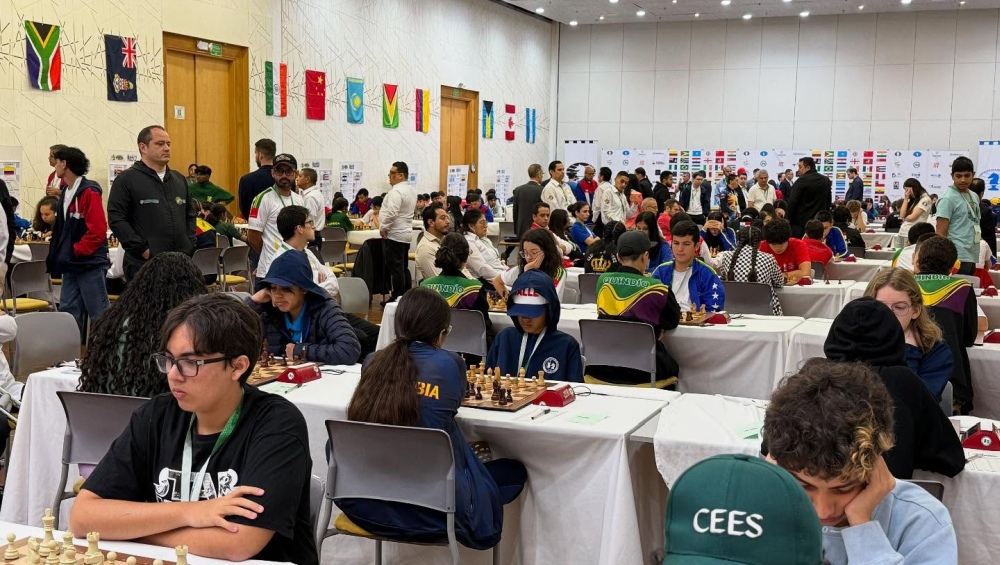
The city of Barranquilla is buzzing with excitement as it hosts the World Youth Chess Olympiad U-16, bringing together teams from more than 45 countries. After the second round, the standings are beginning to reveal the teams showing the strongest performances in this prestigious event. Round 2 highlights After two rounds of play, several teams are leading the standings: Kazakhstan 1 and Kazakhstan 2, demonstrating remarkable consistency across all boards. Georgia and Canada, who continue their winning streak with back-to-back victories. India, FIDE 1, FIDE 2, Cuba 1, Cuba 2, China, Uzbekistan, Paraguay, Peru 1 and four Colombian teams all completing the group of undefeated teams with excellent results. All of these squads have scored two victories in their opening matches, achieving a perfect 4/4. Featured match One of the most talked-about games of the day was the clash between Woman Grandmaster (WGM) Anna Shukman (FIDE) and Peruvian rising star Achatada Mandujano. The duel was fiercely contested and ended in a draw, showcasing the high level of competition. Latin American and Colombian presence The Colombian teams have delivered noteworthy performances, with several squads positioned in the upper half of the standings. Colombia 1, Colombia 2, Colombia 7, and Colombia 13 have all posted solid results, keeping their hopes alive against delegations with strong international reputations. In addition, teams from Paraguay, Peru, Brazil, and Cuba, along with Italy, have scored valuable points to remain competitive in the tournament. Inspiring event The Olympiad is not only a sporting competition but also a cultural and social gathering, strengthening bonds of friendship among nations. Barranquilla is consolidating its place as a global hub of youth chess, hosting some of the brightest talents of the next generation. With every round, anticipation builds over which country will emerge victorious—where the talent, discipline, and passion of young chess players take center stage. FIDE President Arkady Dvorkovich attended the event and made the first ceremonial move in the match between Georgia and the FIDE teams. “I hope at some point we will have the Chess Olympiad in the Americas—not U-16, but the main one. It is our ambition for the future. It is not an easy task, but it is achievable. Having more events here allows local players to improve their skills and gain valuable experience. This competition offers a great opportunity for the younger generation to grow, not only from ‘traditional’ chess countries but also from smaller ones in the Caribbean region. It is a very good sign.” Live Broadcast Renowned Grandmaster and commentator Pepe Cuenca is leading the live coverage of the games, bringing his dynamic and charismatic style that has become a hallmark in the chess world. Fans can follow the most exciting matches with live commentary on the YouTube channel of the Colombian Chess Federation (FECODAZ). All updated results are available HERE. Photos: Federación Colombiana de Ajedrez Official website: youtholympiad2025.fide.com/
FIDE opens bidding process for the 2030 Chess Olympiad
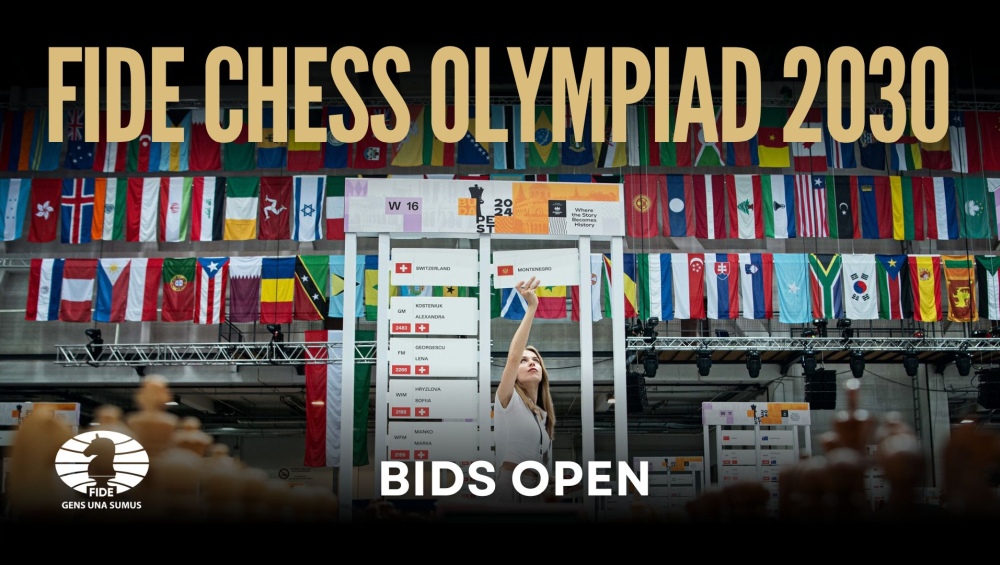
The International Chess Federation (FIDE) has officially opened the bidding process for the FIDE Chess Olympiad 2030, the largest team competition on the chess calendar. This global event, lasting 15 days (including arrivals and departures), brings together thousands of players and fans from across the world. At the most recent Olympiad in Budapest, Hungary, 188 federations registered teams in the Open section and 169 federations in the Women’s section, reflecting the truly universal character of the event. Events to be organised Alongside the main competition, two additional key events will be held under the umbrella of the Olympiad: FIDE Chess Olympiad 2030 – Competition for People with Disabilities (organisers must be ready to host at least 100 teams) FIDE Congress 2030 The selected organiser will be responsible for hosting all three events and providing a proposal that ensures the maximum possible number of teams can be accommodated. With FIDE now uniting more than 200 federations — and expanding each year — the scale and importance of the FIDE Chess Olympiad continue to grow with every edition. Regulations The official regulations for both Olympiad competitions will be approved no later than 30 September 2025 and will follow the structure of the 2028 FIDE Chess Olympiad Regulations in all important aspects: FIDE Chess Olympiad 2028 – Main Competition Regulations (PDF) FIDE Chess Olympiad 2028 – Competition for People with Disabilities Regulations (PDF) The requirements for hosting the FIDE Congress may be found here: FIDE Congress Regulations. Who Can Bid? Any FIDE member federation or organiser approved by a national federation is eligible to apply. Bidders proposing to host additional FIDE events alongside the Olympiad will be given priority. Expression of Interest and Bidding Process Expression of Interest: Non-binding letters of interest should be submitted to office@fide.com no later than 30 January 2026, 18:00 CET. Formal Bid: Complete bidding applications must be submitted to office@fide.com by 15 April 2026, 18:00 CET. Applications must follow the form provided in the approved regulations and include all required documents. The full responsibilities of the organiser, including financial obligations, will be defined in the regulations and any additional conditions. The final decision on the host city will be made by the FIDE General Assembly held during the next FIDE Chess Olympiad in September 2026 in Samarkand, Uzbekistan, which will award the organisation rights to the applicant receiving the highest number of votes.
FIDE Executive Director Victor Bologan promotes chess across the Americas
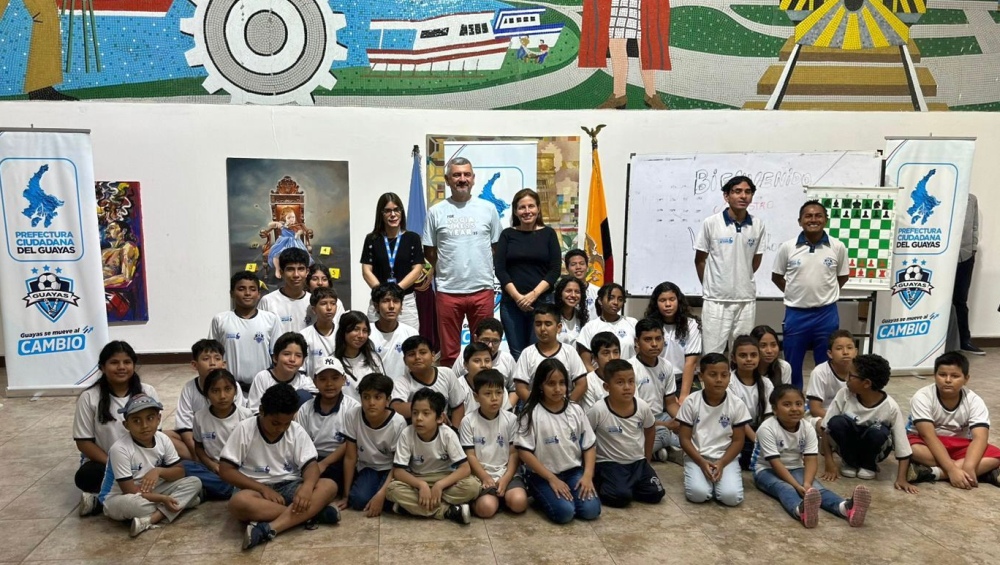
FIDE Executive Director, GM Victor Bologan, has completed an official tour of several countries in the Americas, focusing on the promotion of social chess, chess in multi-sport events, chess in education, youth development, and the strengthening of national chess federations. Panama City, Panama (August 8–9) In Panama, Bologan met with Luis Esquivel, President of the Panama Chess Federation. He also delivered a masterclass for the country’s most promising young players at the local club Proyecto 64, highlighting the importance of nurturing youth talent. Asunción, Paraguay (August 10) In Paraguay’s capital, Bologan held key meetings with sports leaders including Mario Moccia (President, Argentine NOC), Damaris Young (President, Panamanian NOC), Camilo Pérez (President, Paraguayan NOC), and Neven Ilić (President, Panam Sports). Discussions centered on the inclusion of chess in the Pan American Games 2027 in Peru. He also met with Paraguayan Chess Federation President Victor González Gauto and its board members. FIDE expressed its gratitude to CCA President José Carrillo Pujol for his organizational support and active participation in all meetings. Lima, Peru (August 11–12) In Peru, Bologan met with Federico Tong, President of the Instituto de Deporte de Perú, to secure support for chess’s potential inclusion in the Pan American Games. He also conducted a masterclass for Peru’s top young chess players, reaffirming FIDE’s committment to youth development. Guayaquil, Ecuador (August 13–15) In Ecuador, Victor Bologan had a meeting with Francisco Morán Peña, Rector of the University of Guayaquil and a strong supporter of chess. FIDE Executive Director also met Felipe Delgado, President of the Ecuadorian Chess Federation, and José David Jiménez Vásquez, Minister of Sports, to discuss solutions for internal legal challenges and long-term development of Ecuadorian chess. Highlights in Ecuador included a 24-board simul against the country’s youth champions (final score: 22.5–1.5), and a visit to the chess center in Durán, Guayas Province. This center runs a remarkable program across 26 municipalities, providing free chess access to over 1,000 students. FIDE extends special thanks to WGM Martha Fierro for her invaluable efforts in organizing all events in Ecuador. Reflecting on his tour, Victor Bologan said: “Chess is not only a sport but also a powerful educational and social tool. Across the Americas, I was impressed by the energy and commitment of our partners to bring chess into schools, communities, and multi-sport platforms. With such dedication, the future of chess in the region looks very bright.”
Inspiring initiatives in South Africa and Zambia – Women’s Marathon Week 2

From South Africa to Zambia, the second week of the Women’s Chess Marathon has highlighted the passion and progress of women in chess across Africa. As part of FIDE’s Social Year of Chess, August is dedicated to Women in Chess – a global celebration of achievements and an inspiration for the next generation. The centerpiece of this month is the Women’s Chess Marathon, a worldwide initiative of the FIDE Commission for Women’s Chess (WOM), with activities held across all continents. During the second week of the Marathon, the spotlight turned to Africa, where vibrant events in South Africa and Zambia showcased the power of chess to connect, empower, and uplift women and girls. A special guest at both events was WGM Dana Reizniece, Deputy Chair of the FIDE Management Board, who brought her experience, warmth, and encouragement to participants. South Africa: Queen’s Chess Training Workshop & Community Activities In South Africa, the Queen’s Chess Training Workshop was hosted at Club Mykonos Resort in Langebaan, organised in partnership with the South African Chess Federation under the leadership of its President, Andre Lewaks. The workshop brought together talented women players for two days of intensive training. Participants explored strategies for defeating stronger opponents, deepened their understanding of middlegame planning, sharpened tactical calculation, and honed practical tournament skills, while also recognizing the importance of mental and physical stamina. The training was led by FT Eric Takawira, FI Reuben Salimu, and Nadzeya Krauchuk, and of course by WGM Dana Reizniece, whose opening talk “Making it in Chess” set the tone for the event. “They have learned that studying chess is super good, but not enough. Physical fitness, healthy food and good sleep – it all counts,” Dana later wrote, after sharing a morning run before chess classes with the girls. Beyond the workshop, activities extended to the community. Dana led a simultaneous exhibition at Louwville High School, describing the children as “eager for every little tip they can get.” The program also featured a Women’s Month Blitz Tournament, blending passion, competition, and camaraderie. Notably, three women players recently earned new national titles—a milestone celebrated as proof of the growing strength of women’s chess in South Africa. Chess Trainings with Salome Melia Alongside the Queen’s Chess Training Workshop, South Africa has also been benefiting from a longer-term initiative led by IM/WGM Salome Melia, organised in partnership with the South African Chess Federation. Over 35 girls are taking part in weekly online training sessions, complemented by offline events, a special visit, and a dedicated safeguard seminar. The programme provides consistent, high-level guidance while ensuring a safe and supportive environment for all participants. This sustained training ensures that the impact of Women’s Chess Month extends well beyond August, creating lasting opportunities for young talents in South Africa. Zambia: Rapid Women’s Chess Championship Just days later, the focus shifted to Zambia, where the Zambia Rapid Women’s Chess Championship attracted 88 female players – the largest number ever to compete in a women’s chess championship in the country. “For the first time, Zambia gathered so many women players in a chess event,” Dana Reizniece shared on her social media. The championship, organised by the Chess Federation of Zambia in collaboration with WOM, was not only a competition but also a celebration of community. Participants had the chance to hear directly from Dana, who encouraged them to aim higher in chess and in life. Her motivational talk, combined with the energy of the event, left a lasting impression on the players. Why these events matter The Women’s Chess Marathon is more than a series of tournaments and workshops. It creates safe, inspiring spaces where girls and women can: Build confidence by gaining practical chess knowledge and skills Feel supported as part of a global community of women in chess Find role models who show that success in chess and beyond is possible Celebrate together, strengthening the bond between competitive drive and shared experience Such initiatives encourage girls to dream bigger, work harder, and recognize that chess can open doors not only to competitive success but also to personal growth. Looking ahead With the Women’s Chess Marathon continuing through August – reaching Asia, Australia, and Europe in the weeks ahead – the message is clear: women belong in chess, and their potential is limitless. The events in South Africa and Zambia stand as powerful examples of how targeted initiatives, strong partnerships, and inspiring role models can change lives – even in just a couple of days. They embody the mission of the FIDE Commission for Women’s Chess: to grow participation, create opportunities, and ensure that every girl with a love for the game knows she has a place at the board. FIDE and WOM thank the South African Chess Federation, the Chess Federation of Zambia, and all organisers, coaches, and participants for their dedication to making these events a success. The #WomensChessMarathon continues.
A night of celebration and chess: World Under-16 Chess Olympiad begins in Barranquilla, Colombia

Yesterday, the city of Barranquilla, Colombia, hosted the grand opening ceremony of the World Under-16 Chess Olympiad at the Elías Chegwin Coliseum. With delegations from 45 countries and 86 teams, the parade of flags filled the arena with color and excitement, marking the official start of one of the world’s most prestigious youth chess competitions. The evening was filled with joy, music, and culture, concluding with an unforgettable performance by the winner of Yo me llamo Shakira, who thrilled the audience with her show. Prominent figures from the International Chess Federation (FIDE) and FIDE America attended the event, reaffirming international support for the growth of chess in Colombia and highlighting the significance of this global sporting occasion. Distinguished personalities from the chess world, as well as from the sporting and cultural spheres, were present, including José Carrillo Pujol, President of FIDE America; the FIDE America board; Akaki Iashvili, FIDE Special Tasks Director; Victor Bologan, FIDE Executive Director; Dr. Vivi Barguil, Executive Director of the Rueda Rueda Foundation; Weymar Muñoz, President of the Colombian Chess Federation; and Daniel Trujillo, Sports Secretary, along with delegates, federation presidents, and representatives of various partner organizations. FIDE Executive Director Victor Bologan and FIDE Continental President for the Americas José Carrillo Pujol made the first ceremonial moves, officially setting the competition underway. The Colombian Chess Federation extends its deepest gratitude to all the individuals, institutions, and organizations that made this Olympiad possible—especially the sponsors, whose support has helped transform Barranquilla into the world epicenter of youth chess. Photos: Federación Colombiana de Ajedrez Official website: youtholympiad2025.fide.com/
GCT Saint Louis Rapid and Blitz: Levon Aronian captures the title

Levon Aronian won the Grand Chess Tour Saint Louis Rapid and Blitz in convincing fashion, finishing three points ahead of runner-up Fabiano Caruana. Held at the World Chess Hall of Fame in St. Louis, Missouri, from August 11–15, the final rapid and blitz event of the 2025 season featured six full-tour players and four wildcards. The tournament included nine rounds of rapid (2 points for a win, 1 for a draw), followed by eighteen rounds of blitz (1 point for a win), for a total of 135 games across five days. The rapid section turned into an exciting race between Caruana and Aronian. After defeating his main rival in their head-to-head clash, Caruana topped the rapid standings with an excellent 14/18, while Aronian trailed just one point behind. The oldest participant in the field, Aronian carried his strong form into the blitz, notably winning both games against Caruana and securing the title with two rounds to spare. Caruana, the leader after the rapid, struggled in the blitz as surprising mistakes and blunders crept into his play. Even so, his strong rapid result was enough to keep him in second place, just half a point ahead of Maxime Vachier-Lagrave. Despite finishing only sixth in the blitz, the Frenchman retained his third overall position and, thanks to that result, climbed to the top of the Grand Chess Tour standings—most likely punching his ticket to the Tour Finals in São Paulo. Nodirbek Abdusattorov, who started the blitz segment seventh in the standings, produced a remarkable surge by tying for first place in the blitz portion and ultimately finishing fourth, just half a point behind MVL. World Champion Gukesh D delivered a solid showing in the rapid, but a seventh-place finish in the blitz left him in the sixth position overall. Photos: Saint Louis Chess Club / Lennart Ootes Official website: grandchesstour.org/
Vincent Keymer wins Quantbox Chennai Grand Masters 2025
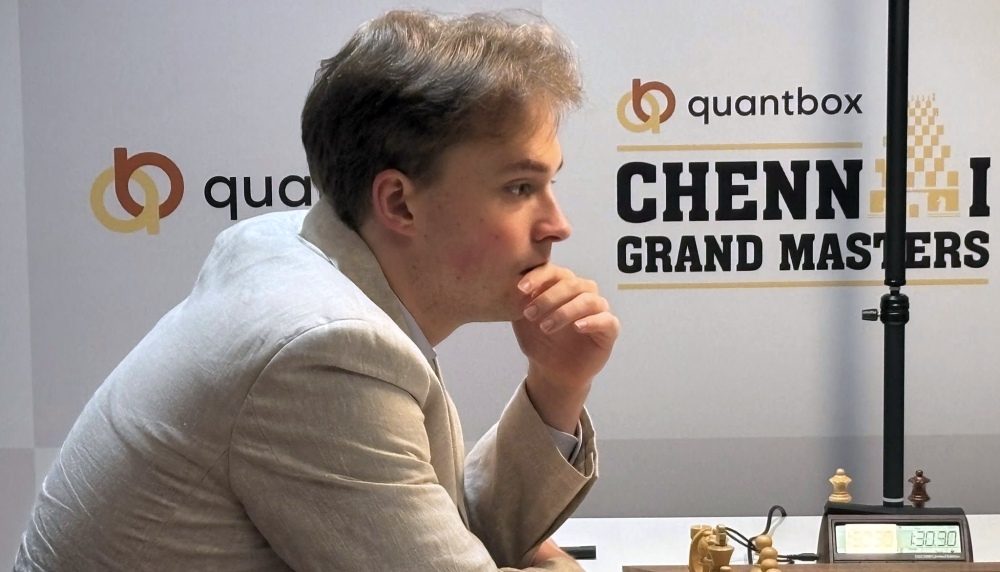
GM Vincent Keymer clinched the title at the Quantbox Chennai Grand Masters 2025 with an impressive score of 7/9. The German chess star secured the championship and the first prize of almost $30,000 with a round to spare, earning 21 rating points in the process. He is now likely to debut in the top 10 of the FIDE September rating list. The 2025 Quantbox Chennai Grand Masters, a 10-player round-robin with classical time control, was held from August 6–15 in the capital of Tamil Nadu. Third seed Keymer made a blazing start, winning his first three games and taking the lead, which he never relinquished. Heading into the final round with the title already secured, he outplayed Ray Robson with the black pieces to finish with a +5 score. Anish Giri pulled off a crucial final-round victory over Jorden van Foreest in a hectic game to catch up with top seed Arjun Erigaisi and Murali Karthikeyan, who drew their game. This trio tied for second place on 5/9, with Giri taking silver and Erigaisi bronze based on the Sonneborn-Berger tiebreak. Keymer and Giri were the only players to remain unbeaten in the event. Final standings: 1 GM Keymer, Vincent GER 2730 7 2 GM Giri, Anish NED 2748 5 3 GM Erigaisi, Arjun IND 2776 5 4 GM Karthikeyan, Murali IND 2658 5 5 GM Nihal, Sarin IND 2692 4½ 6 GM Liang, Awonder USA 2696 4½ 7 GM Vidit, Santosh Gujrathi IND 2720 4 8 GM Van Foreest, Jorden NED 2697 4 9 GM Pranav, V IND 2597 3 10 GM Robson, Ray USA 2687 3 Photos: ChesssBase India
FIDE Education Commission announces its 28th “Preparation of Teachers” course
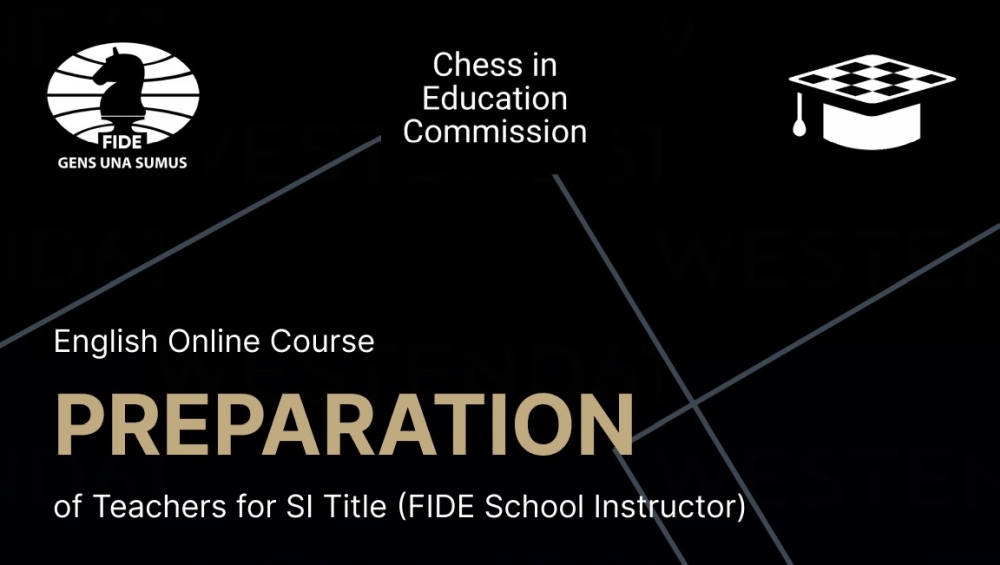
FIDE Chess in Education Commission is pleased to announce the dates of the new Preparation of Teachers course. The course will be held online in English from August 22-24, 2025. The target audience is teachers, chess educators, beginner and advanced players with basic chess knowledge and experience working with children. This brand-new course is focused on chess as an educational tool in the classroom. Participants, based upon their exam results, qualify for the FIDE title of School Instructor. Upon successful completion of the course, participants will be offered lifetime access to the Opening Master premium chess databases, which currently hold more than 9.6 million official over-the-board human chess games and are growing on a monthly basis. Read the detailed course description here. Candidates who wish to attend the course must complete and return the following registration form: cloud.fide.com/s/kBpkMnW4XydtKd5 The cut-off date for applications is August 19. Applicants are accepted on a first-come, first-served basis, and the maximum number of places on each course is 20. Note: Titles are conferred during the subsequent FIDE Council meeting and will reflect on FIDE profiles approximately four weeks thereafter. Share with colleagues and friends! Let’s make chess education more accessible and effective together! If you have any questions, please feel free to contact us at edu.courses@fide.com
FIDE opens bidding process for the 2026 Candidates and Women’s Candidates Tournaments
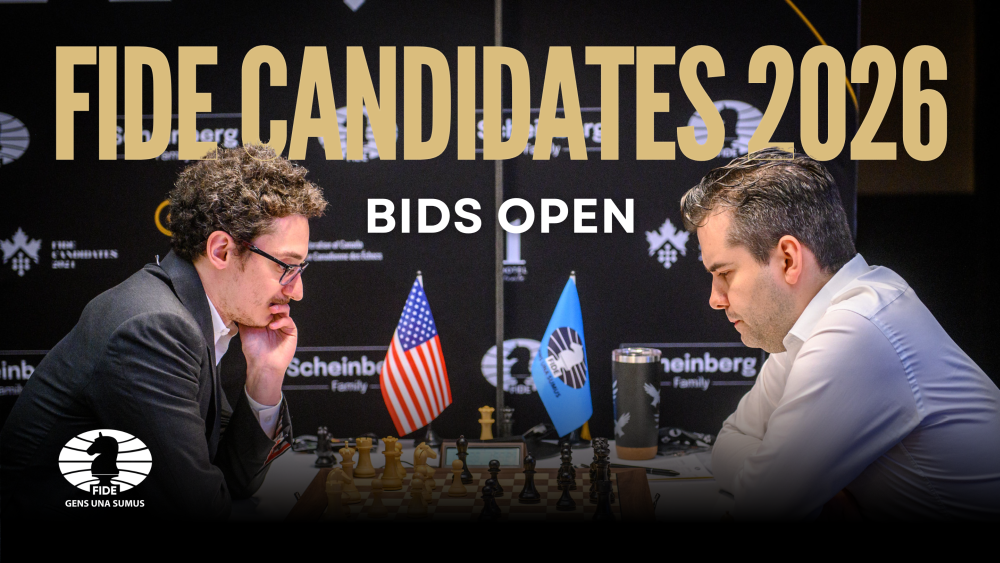
The International Chess Federation has officially opened the bidding process for one of the most anticipated events on the chess calendar – the 2026 FIDE Candidates Tournament and the 2026 FIDE Women’s Candidates Tournament, two major events scheduled to begin between 25 March and 5 April 2026. As the final step in the qualification for the World Championship Match, the Candidates is the gateway to challenging for the ultimate title in chess. It is one of the most-watched events in the sport, bringing together the world’s best players in an intense battle of skill, preparation, and endurance. Key facts and requirements: 8 participants in each tournament Duration: up to 22 days Minimum prize funds: Open Candidates – €700,000 (up from €500,000 in 2024) Women’s Candidates – €300,000 (up from €250,000 in 2024) Minimum combined prize fund: €1,000,000 All organisers must respect FIDE sponsor and partner rights, including video and game broadcast Bids are open to any FIDE member federation or organiser approved by their national federation. The bid submission period runs from August 12 to October 15, 2025 (23:59 Lausanne time), with all documents submitted in English to office@fide.com. The FIDE General Strategy Commission will evaluate all applications, and the FIDE Council will approve the final host city. Full bidding regulations for both events can be found in the official documents: Regulations for the FIDE Candidates 2026 Regulations for the FIDE Women’s Candidates 2026 Call for bids – FIDE Candidates Tournaments 2026 Bidding Form (DOCX)
idChess Technology at the WSTCC 2025: Live streaming, VAR, and video highlights
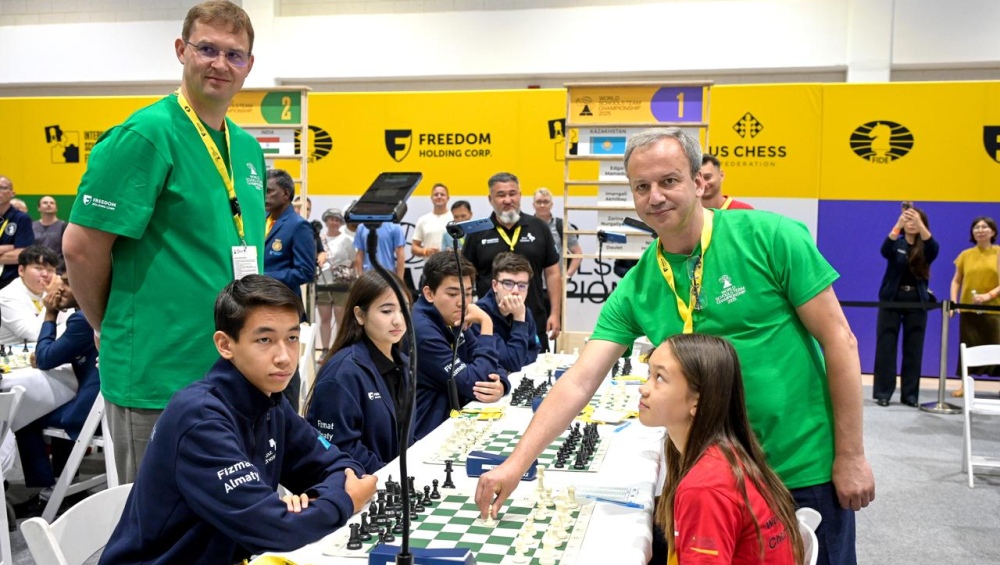
The 2025 World Schools Team Championship took place at Episcopal High School — just 11 kilometers from downtown Washington, D.C. — from August 3–7, bringing together over 50 teams from six continents. For the first time in the history of the competition, it featured innovative idChess technology for real-time game broadcasting to chess fans around the world. idChess enables live game broadcasting on any chessboard using only a smartphone: phones are mounted on tripods beside the boards, and games are automatically converted into PGN format through computer vision and AI technologies. The platform also supports VAR — a video assistant for chess — helping arbiters make informed decisions in controversial situations. In July 2023, FIDE announced the adoption of idChess VAR at international tournaments, marking a new approach to officiating and ensuring fair play while providing players, coaches, and fans with richer content and deeper insight into games. Another notable feature is the automatic creation of video highlights. Trained on millions of chess games, the idChess neural network identifies and marks the best moves and combinations. The platform then generates short video clips, which tournament organizers can publish on their page on the idChess Media Platform. Watch the games of the World School Team Championship here. “The World Schools Team Championship is not only a celebration of young chess talents but also a platform for innovation,” said FIDE President Arkady Dvorkovich. “By integrating idChess into this year’s event, we are setting a new standard in how youth competitions are run and experienced around the world. It reflects our commitment to making chess more accessible and engaging, especially for the next generation.” idChess technology is now used at tournaments in more than 150 countries, including national championships, international opens, school competitions, and regular chess club meetings. The platform is recognized for its simplicity, requiring only smartphones, tripods, and a stable internet connection. For organizers, idChess offers a fast and affordable way to enter the world of digital broadcasting. Schools and federations can adopt the system with minimal technical training, opening new possibilities for promotion, engagement, and game review. Organizers can submit a request to receive free access to a tournament organizer account. idChess official website: idchess.com/

